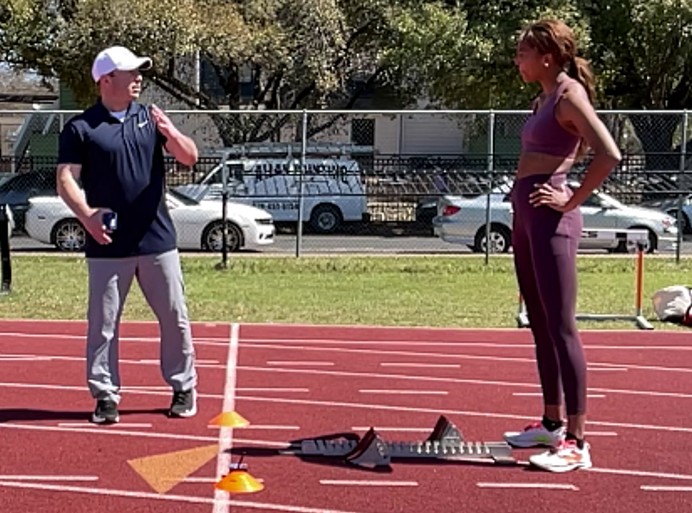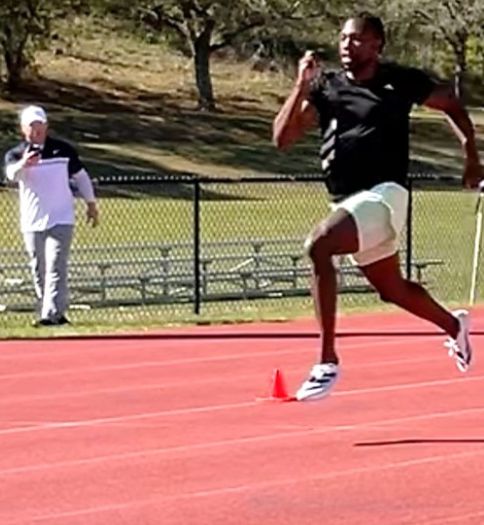Kinesiology’s Dr. Ken Clark Continues Olympic Connections
 On the first weekend in April, Dr. Ken Clark ’09, assistant professor of kinesiology
in WCU’s College of Health Sciences, was watching as a new era in track began with
the first competitions in the brand-new Grand Slam of Track (GST), brainchild of Olympic
icon Michael Johnson. Gabby Thomas, a three-time Olympic gold medalist at the Paris
Olympics last year, is one of the GST contracted athletes and one of the elite sprinters
whose biomechanics Dr. Clark regularly analyzes in person and via video.
On the first weekend in April, Dr. Ken Clark ’09, assistant professor of kinesiology
in WCU’s College of Health Sciences, was watching as a new era in track began with
the first competitions in the brand-new Grand Slam of Track (GST), brainchild of Olympic
icon Michael Johnson. Gabby Thomas, a three-time Olympic gold medalist at the Paris
Olympics last year, is one of the GST contracted athletes and one of the elite sprinters
whose biomechanics Dr. Clark regularly analyzes in person and via video.
Dr. Clark spent part of spring break consulting with Thomas and her coach Tonja Buford-Bailey in Austin, TX, conducting on-track analysis and video data analysis, part of his work in sprint biomechanics with USA Track & Field (USATF). That week, he also traveled to Clermont, FL, to consult with Paris Olympics 100 meters gold medalist Noah Lyles and his coach Lance Brauman. Lyles, crowned “World’s Fastest Man” after that Olympic achievement, also won a trio of gold medals (100 meters, 200 meters, and 4 × 100-meter relay) at the 2023 world championships.
“I feel fortunate in that is the type of opportunity that few other sports scientists get to experience,” says Dr. Clark, whose expertise in biomechanics and sprinting brought him to the attention of USATF. He was named the 2024 USATF Sports Scientist of the Year.
Dr. Clark provides technique analysis on the athletes’ sprinting mechanics through weekly data collection and says it’s a way of quickly evaluating what might be going right or wrong. Coaches or USATF personnel do the filming and send him the videos.
“It’s a great monitoring tool. Reviewing the normative data for so many athletes over time is a benefit for coaches so they can advise their athletes to ramp up or tone down their work. It helps coaches make informed decisions.”
Dr. Clark works on a daily basis with Tyler Noble, USATF’s Lead Sport Science & Data Analyst for USATF, and on a regular basis with Dr. Robert Chapman, USATF’s Chief of High Performance Operations. Dr. Clark began with USATF in 2017 assisting biomechanist Ralph Mann (who died 1/2/25 at age 75), an Olympic sprinter and hurdler (silver in 400m hurdles in Munich 1972) who became one of the world’s leading researchers and clinicians in sprint and hurdle biomechanics.
Dr. Clark made on-track visits with elite sprinters for USATF from 2017-2019. The pandemic curtailed travel so he conducted remote video analysis from 2020 through 2022. In 2023, he traveled to Texas in August to consult with the “relay camps where the teams get together and I was on the track with the eight best male and female runners.”
“This speaks directly to the high level of expertise we have here at WCU,” notes Scott Heinerichs, dean of the College of Health Sciences.

WCU students are benefiting as part of the research team funded over the last five years via this USATF/WCU research agreement. Two to three WCU master’s students are funded annually through these grants to study sprint biomechanics. Former graduate student Christopher Meng was the first to work on the project and earned the 2023 USATF Graduate Student Sports Science Award. He is now an assistant track and field coach at Princeton University. Current graduate student Lily Palacio-Lewis is captain and star sprinter on the WCU women’s track team. Graduate students Andrew Torney and Barrett Snyder have also worked on this project. Dr. Clark also credits research engineer consultant Dr. Larry Ryan for bringing his expertise in math and physics, computer coding, and signal processing to assist with data analysis.
Dr. Clark also works regularly with female sprinter English Gardner, one of the fastest American female sprinters of all time. She won a gold medal for the women’s 4x100m relay team in the 2016 Olympics and a silver for the women’s 4x100m relay team in the 2020 Olympics. In addition, Dr. Clark coaches WCU athletes and works with the Garnet Valley High School football team during summer speed training.
He also conducts additional research with an upcoming study this fall involving the WCU track team. The data will help inform our coaches, he says. “Plus, the human performance lab on campus is a great addition to our lab, he says, growing our footprint in the field of biomechanics.”
This summer, Dr. Clark will be on campus but will make other on-track site visits and will travel to the national championships in late June as well as the high performance summit in late October in Las Vegas. Right now, he is anticipating the Penn Relays April 24 to 26 and the continuation of the Grand Slam of Track in Miami, then Philadelphia May 30 to June 1, concluding in Los Angeles.
